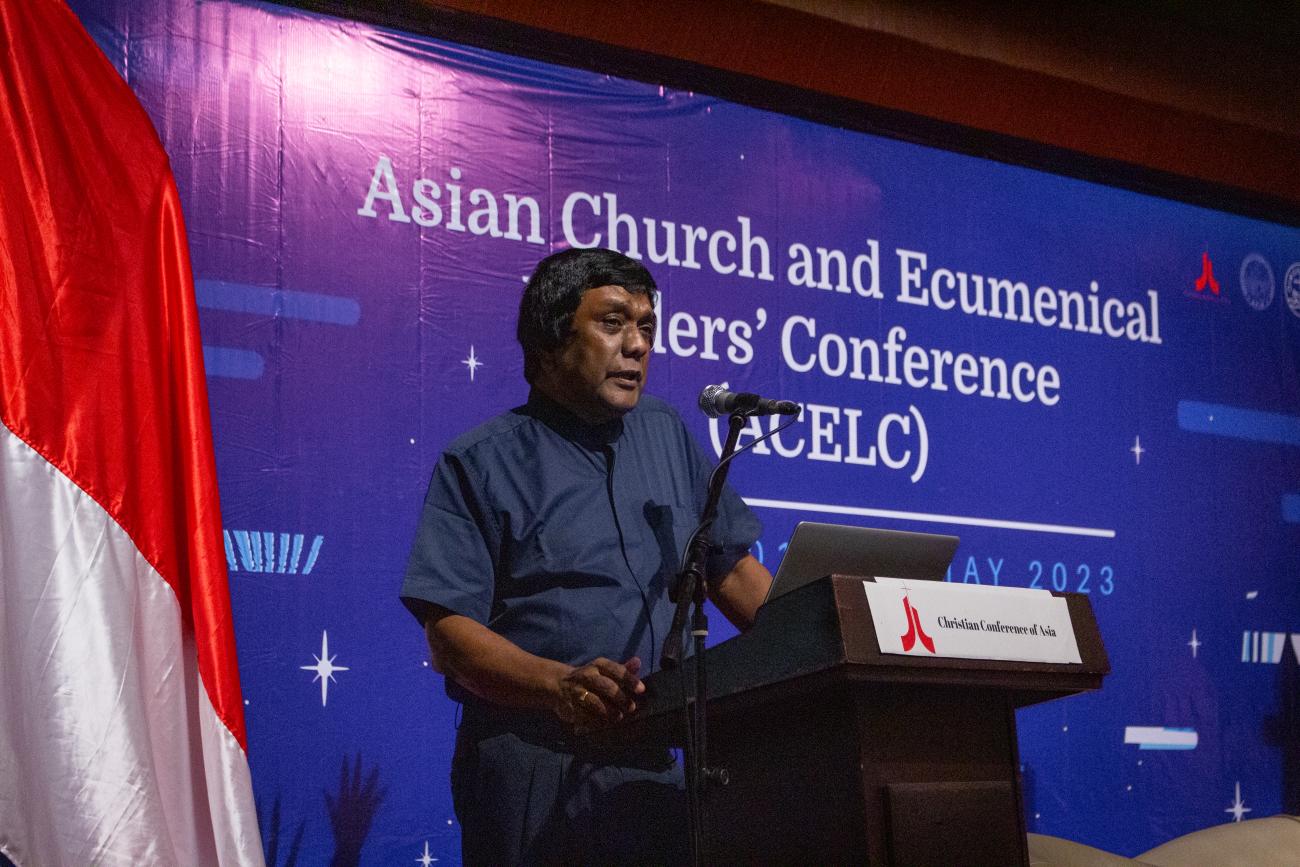Diakonia, inseparable from the Church, is movement of accompaniment and sacrifice, asserts Asian Church leader Ebenezer Joseph

Rev. W. P. Ebenezer Joseph, the President of the Methodist Church in Sri Lanka, delivers the Biblical-theological perspective on 'Diakonia: Solidarity and Accompaniment' on the final day of the ACELC
Jakarta, Indonesia: Delivering a Biblical-theological perspective on the final day of the Asian Church and Ecumenical Leaders’ Conference (ACELC), organised by the Christian Conference of Asia (CCA), Rev. W.P. Ebenezer Joseph, the President of the Methodist Church in Sri Lanka, spoke on ‘Ecumenical Diakonia: Solidarity and Accompaniment’.
“Ecumenical diakonia is not comfortable or pleasant; it is to be immersed in a journey that expresses solidarity until the aspirations of those we serve are fully met…We must be immersed in the pains and agonies of people, and walk with them in the journey they determine, we must be with them until they experience a perfect transformation. Have we [as the Church] discerned the nature of our call to be in solidarity and accompaniment?” remarked the head of the Methodist Church in Sri Lanka and recipient of the 2022 World Methodist Peace Prize.
Rev. Joseph further said, “We must have the humility to hear the voice of God and recognise God’s voice amidst cries of the people. If we only see and act without hearing what God is asking us to do, we lose an essential characteristic of being the Church and then are reduced to being an NGO…Journeying with the people must be a movement, not a managed enterprise. The diakonia of the church cannot be separated from the church in the name of efficiency or management.”
Recounting the service and accompaniment of the Sri Lankan churches during the thirty-year civil war, the 2004 tsunami, and the more recent economic crisis, Rev. Joseph said, “The [Sri Lankan] people saw the witness of the Church as one that accompanied in solidarity with and among them, that did not abandon them or escape but suffered and served with and among them. The call for solidarity and accompaniment is rooted in self-sacrifice and needs courage, commitment, and hope. The contemporary Asian Church needs to repent, reflect and reorient its lifestyle, renew its commitment, reaffirm its hope, respond in faith, and be ready to sacrifice itself.”
Elaborating on the statement that the Church should not fear sacrificing itself, Rev. Joseph said that it was commonly felt that the Church needed protection and if the Church crumbled, our God would crumble. However, God did not depend on the structures of the Church. “Jesus said, unless the seed dies it will not bear fruit; is the Church willing to die?” asked Rev. Joseph, while adding that in every death for the sake of the other, we experience resurrection. Sharing the example of the first martyr, Stephen, he said that the first person who was consecrated for diaconal work was the first to be killed and not Peter or Paul who were the proclaimers, and that this was what diakonia demanded from the people who responded to its call.
Rev. Joseph concluded with thought-provoking questions, such as, “Will we give up solidarity and accompaniment when there is no donor money, no specialists, no profit, nor recognition or affirmation? Are we willing to serve as one Church with an ecumenical dimension, rather than as separate denominations? We serve people regardless of their faith—but are we willing to serve with people of other faiths?”
The rousing presentation elicited strong responses from the participants of the ACELC, which included reflections on how the church could navigate systemic and institutional challenges, addressing internal biases and agendas that impede ecumenical diakonia, and witnessing to perpetrators of injustice. Comments and insights were shared by Bishop Timothy Kwok from the Anglican Church in Japan, Rev. Juliana Temperaja from the Protestant Church in East Timor, and Rev. Mery Kolimon from the Protestant Evangelical Church in Timor, Indonesia.
The session was moderated by Rev. Jimmy Sormin from the Communion of Churches in Indonesia (PGI).










